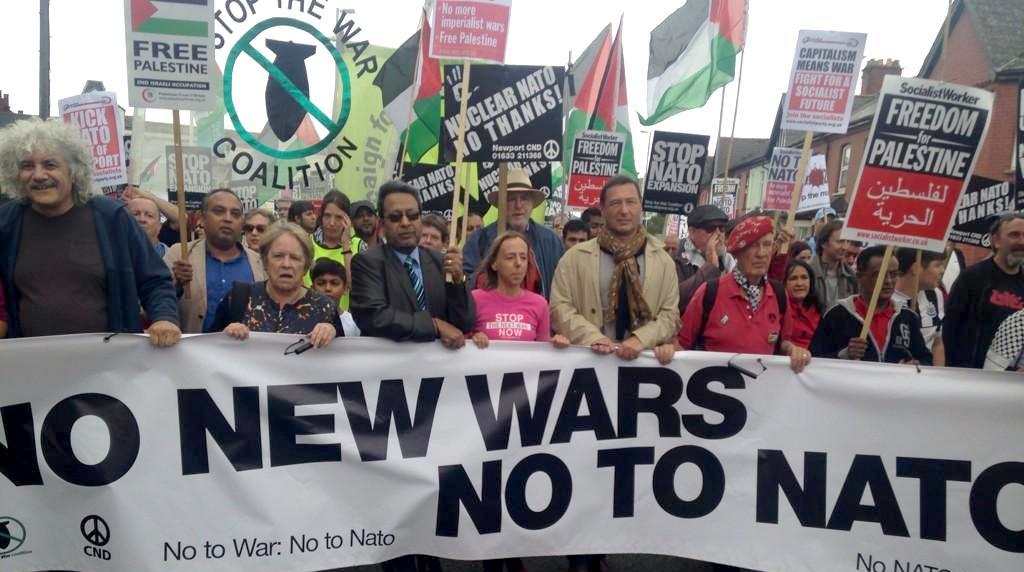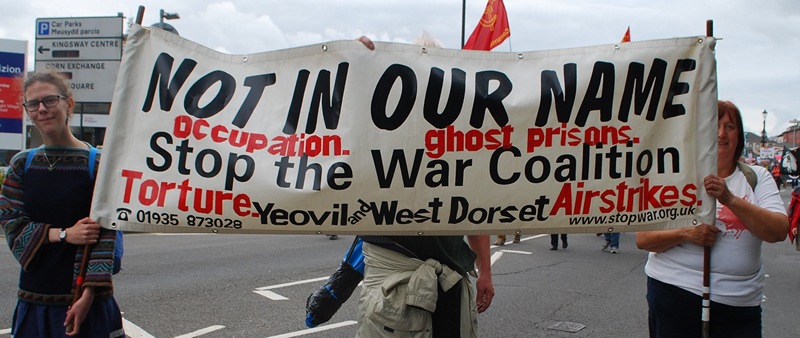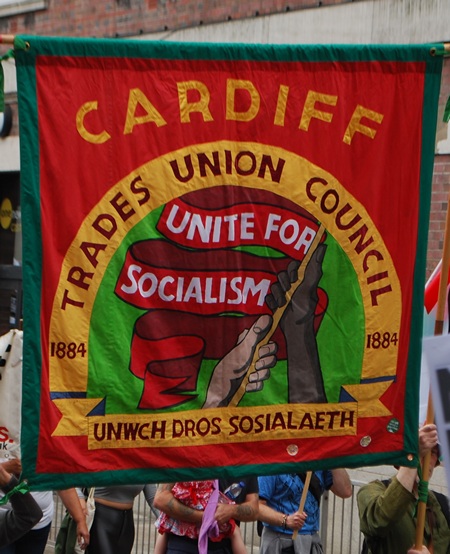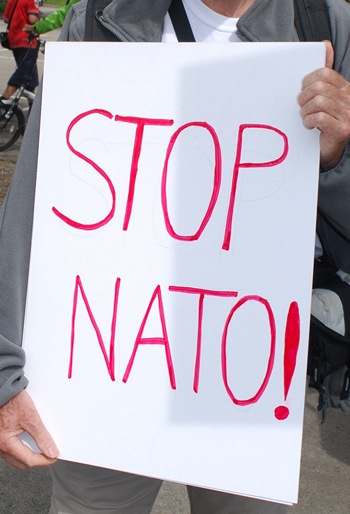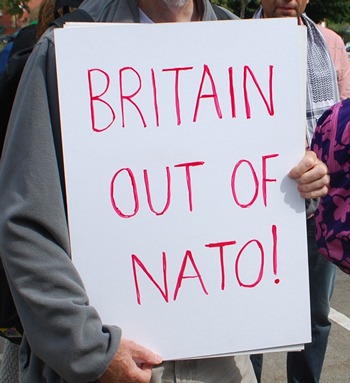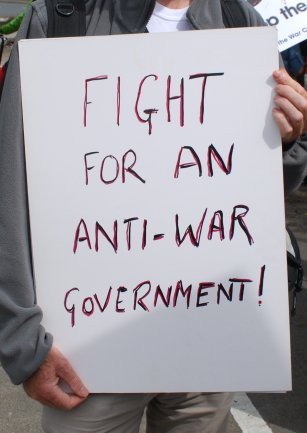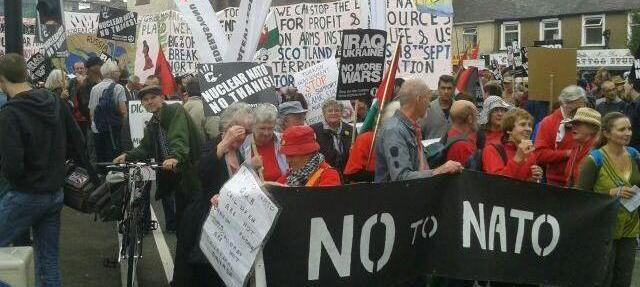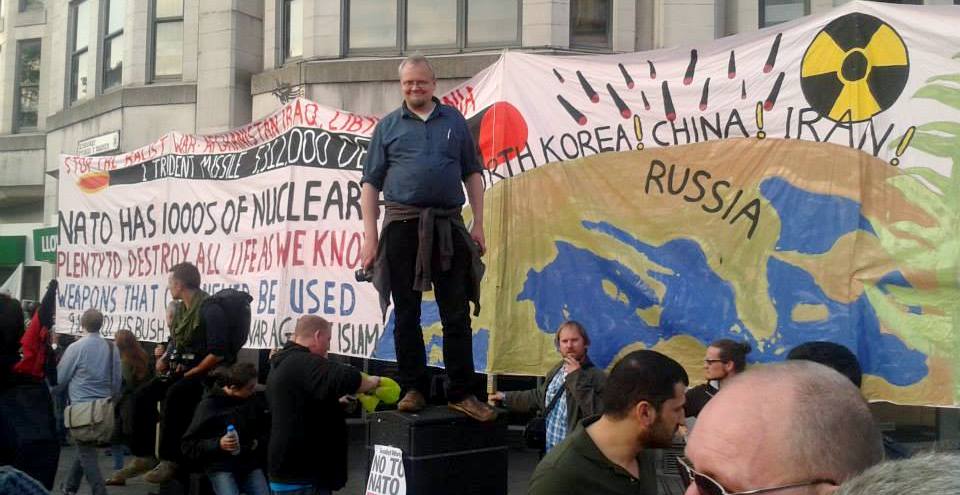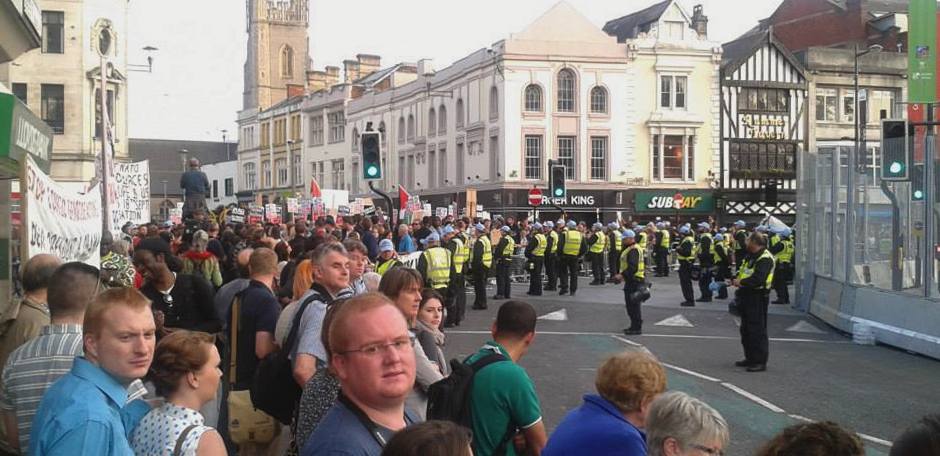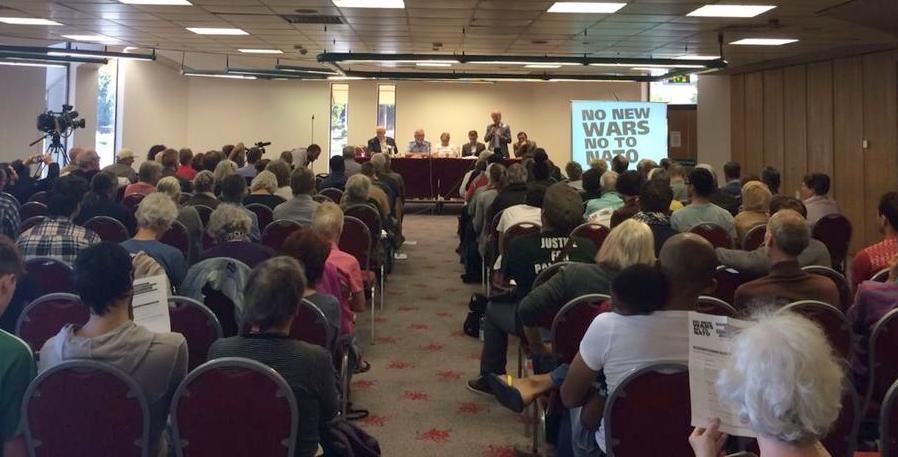|
September
13,
2014
-
No.
32
New War on
Iraq and Meeting of NATO Warmongers
Canada Needs an Anti-War Government!
No to Canada's Participation in New U.S Adventure in
Iraq and Syria! Get Canada Out of NATO Now!
The U.S. is the major threat to world peace and
security. Of this
there is no doubt. This is fully evidenced by the destruction wrought
by the U.S. and the U.S.-led aggressive NATO alliance, as well as its
close ally Israel, in Afghanistan, Iraq, Libya and Palestine, to name
just a few recent examples.
Now in Iraq and Syria, a fraudulent scheme is being
whipped up to
present a
group, the Islamic State of Iraq and the Levant (ISIL) as a threat to
Iraq and world peace. After the U.S. destruction of Iraq following four
successive invasions, years of brutal sanctions and unspeakable crimes
against its people and resistance,
the U.S. and its allies including Canada shamelessly present themselves
as saviours of the Iraqi and Syrian people. They do not mention that
such groups
as Al-Qaeda, ISIL and others arise in the destruction created by the
imperialists or are directly funded by the U.S. and others to serve
imperialist aims. All rational inquiry into how to provide solutions to
the serious problems created is made impossible.
In addition to targeted drone strikes the U.S. has now
placed a
total of 820 U.S. troops in Iraq. This new development was carried out
under the
pretense of "protecting U.S. diplomats in the Iraqi capital." The U.S.
has a long history of using this hackneyed pretext as the fig leaf to
cover up its ground invasions and dirty
wars.
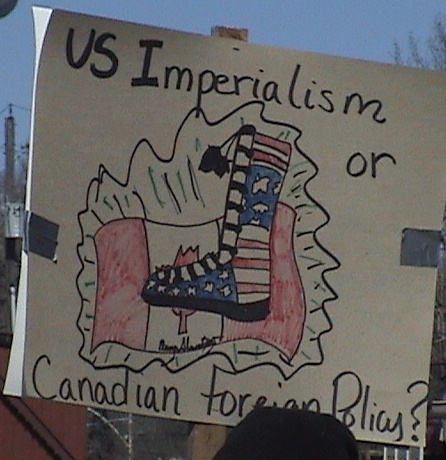 Meanwhile, the Harper government
has stooped to a new
low in its
subservience to U.S. warmongering by sending Canadian "special forces"
to Iraq,
with the tacit support of the NDP and Liberal parties in the
Parliament. The majority of Canadians vociferously opposed the Iraq war
under George W. Bush and any U.S.
invasion of Syria, but now the Harper government has openly embroiled
Canada in a new war on Iraq and Syria. Canadians have been told that
joining this invasion is already done and a fait accompli.
They are given no say in the matter at all. Meanwhile, the Harper government
has stooped to a new
low in its
subservience to U.S. warmongering by sending Canadian "special forces"
to Iraq,
with the tacit support of the NDP and Liberal parties in the
Parliament. The majority of Canadians vociferously opposed the Iraq war
under George W. Bush and any U.S.
invasion of Syria, but now the Harper government has openly embroiled
Canada in a new war on Iraq and Syria. Canadians have been told that
joining this invasion is already done and a fait accompli.
They are given no say in the matter at all.
On
September 6, CBC reported that Canada is sending 100 members of the
Armed Forces to Iraq, including special operations forces. According to
Prime Minister Harper, U.S. President Barack Obama personally requested
a
commitment of "military advisers" based on the U.S. assessment of the
needs on the ground. It
is said the contingent of Canadian special operations forces will work
closely with U.S. forces but remain under the full command of Canada's
Chief of Defence Staff. The issue of the chain of command for Canadian
forces is of course moot when the Canadian government permits its
foreign policy to be set by the
U.S. President, calling himself "Commander in Chief."
A spokesman for Harper described the broader Canadian
mission as one
that provides "strategic and tactical counsel to Iraqi forces before
they start tactical operations" against ISIL. "This is an
advise-and-assist role, not one in which Canadian Forces will be
accompanying Iraqi forces on missions [or] tactical
operations. They are there to provide advice that will help the
government of Iraq and its security forces be more effective against
ISIL," said Harper's communications director Jason MacDonald in an
e-mail to the CBC.
MacDonald's remarks belie the fact that Canada is doing
more than
providing personnel to give "advice" but is actually delivering weapons
to Iraq. Canada has sent two military transport planes to the region: a
CC-130J Hercules as well as a CC-177 Globemaster, which on August 28
delivered weapons donated by
Albania. Other reports indicate that Canada has joined the U.S.,
Britain,
France, Australia and Italy in transporting guns, mortars and
ammunition to "Iraqi forces."
Canada has committed $21 million in "humanitarian
assistance" to
Iraq as well as "non-combat" military assistance. On August 29,
Minister of International Development Christian Paradis announced that
Canada
has started sending relief supplies to Iraq from a new emergency
warehouse
that it established in Dubai. This is part of arrangements it has been
putting in place around the world to enable
its military to more quickly react to "events" in Asia and Africa.
Such claims also reveal that the term humanitarian has
become
completely meaningless as it is used to hide the criminal nature of the
actions of war governments.
According to news reports, the military assistance to
Iraq is
funnelled through the Iraqi government, but intended primarily to
"bolster Kurdish fighters in Iraq's north," considered a more effective
fighting force than other Iraqi forces. This glosses over the fact that
Iraqis are one people
who resisted the U.S. occupation of their homeland for more than 10
years.
However, those resistance forces are likely not keen to fight alongside
the U.S. in its latest adventure in their country. It also indicates
the U.S. has not succeeded in creating an effective Iraqi puppet
army.
"All-Party" Non-Partisan Political Solidarity to
Interfere in Iraqi Affairs
The
Harper government is said to be taking a "two-pronged" approach in Iraq
through a military invasion while doing diplomatic dirty work to get
the Iraqi government to "counter the threat" of ISIL.
On September 3, Foreign Affairs Minister John Baird
travelled to
Iraq. Paul Dewar and Marc Garneau, the NDP and Liberal Foreign Affairs
Critics respectively, accompanied Baird at his request in a show of
"non-partisan political solidarity."
Baird met with senior members of the incoming government
of
Haider-al-Abadi, successor to Nouri al-Maliki, who served as Iraq's
prime minister for the past eight years. The visit was to arrogantly
tell the Iraqi government how they should make up their cabinet and
claim that the imperialist nation-building formula based on
divide-and-rule is the opposite.
"Canada has consistently called for Iraqi leaders
to come together and govern for all Iraqis, regardless of religion, for
the sake of the security, democracy and prosperity that the Iraqi
people are striving to implant in their country," Baird's spokesman
Rick Roth said ahead of the minister's arrival in Baghdad. "It is our
hope that this visit highlights our commitment
on this front."
In a September 5 Globe and Mail op-ed, Baird
wrote: "We
spoke to the leadership in Baghdad and Erbil about the dire security
situation and the catastrophic humanitarian crisis. Talk and diplomacy
during these times are crucial. But actions speak louder than words. I
was pleased to see first-hand
with my colleagues the positive impact of Canada's two-pronged
assistance to Iraq -- helping the victims of ISIL's actions and
supporting those who are on the front lines in the fight against ISIL."
For his part, Dewar, referring to what a new Iraqi
cabinet "should
look like," said, "It will have to be more than one-face change. A new
prime minister needs to have a team around him that is going to include
all minorities, particularly including the Sunnis." He characterized
the visit as "a multipartisan trip
to assess what's happening in Iraq, to assess what Canada can do."
Garneau attempted to blame the Iraqi government rather
than the U.S.
for the chaos in the region and the destruction of the country saying
Al-Maliki was unable to unite Sunnis, Shiites, Christian minorities and
other groups, "and this is one of the reasons that the Islamic State
has been able to implant itself vigorously
in Iraq." He told the Canadian Press that "we all have the same
interests here. [ISIL] is a scourge and we have come together to help
Iraq here."
Calls for Consensus on New Iraq War
A
special meeting of the
House of Commons Standing Committee on Foreign Affairs and
International Development was convened on September 9 to brief Members
of Parliament on the deployment of Canadian Forces personnel to Iraq,
with the participation of the Ministers of Foreign Affairs and
National Defence, as well as the Chief of Defence Staff.
Speaking to CBC News on September 5, an official from
the
NDP
suggested "any new mission of substance should be approved by the
House."
In this way Canadians are being set-up to rally behind a
policy
debate about how to invade Iraq and Syria in various ways, as was the
case leading up to the 2003 Iraq war. At that time, the debate was that
if the
Security Council approves the invasion Canada should join but not
otherwise. Canadians rejected this fraud
at that time and will do so again today.
Say No to Canada's Invasion of Iraq!
Defeat Harper by Fighting for an Anti-War Government!
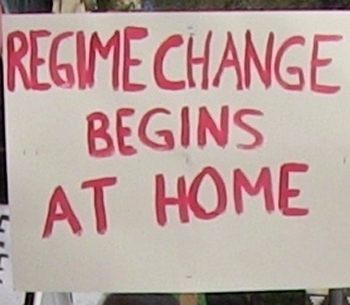 The Harper
government openly speaks about what governments they want or do not
want
in countries, as if the peoples of those countries are irrelevant and
have no right to decide their own futures or
the governments that they desire. It is to their shame that the
opposition parties are giving this sham a veneer of all-Canadian
support despite the fact that it has none. This is in keeping with
their utter contempt for the polity in Canada as well. The Harper
government openly speaks about what governments they want or do not
want
in countries, as if the peoples of those countries are irrelevant and
have no right to decide their own futures or
the governments that they desire. It is to their shame that the
opposition parties are giving this sham a veneer of all-Canadian
support despite the fact that it has none. This is in keeping with
their utter contempt for the polity in Canada as well.
Canadians
need a new and modern constitution which forbids Canada's
armed forces from being used for aggressive purposes, which also means
immediately getting out of NATO. Canada needs an anti-war government
which takes independent stands that contribute to peace internationally
and which
opposes the use of force in international affairs. The Harper
government should be stopped in order for Canada to contribute to peace
internationally.
Defeating the Harper government does not simply mean
voting
differently, it means defeating the agenda of war and militarization of
the economy and culture which the Harper government has championed.
Canadians do
not want a nicer version of a pro-war, pro-occupation,
pro-militarization government and life. They want an
independent Canada which is not joined at the hip to the U.S. war
machine and its adventures around the world. They want a government
that upholds norms of international law as a principle, not a choice.
They want a government that builds friendly relations between and
amongst all peoples of the world, not one
that divides the world between so-called good and evil.
The Harper government's colonial outlook divides the
world between
forces of "good" and "evil," between those who are for "freedom" and
those who are against it in a manner that seeks to destroy humanity.
Canadians are supposed to rally behind the forces of "freedom" and
agree to accept the slaughter of
the forces of "evil." The whole aim of the Harper government is to get
Canadians to give up their anti-war principles and independent
organizing so that they are passive in the face of the destruction of
all norms of civilized national and international behaviour.
The peoples of the world represent one humanity that
aspires for
peace and friendship. The image the Harper government paints of the
world divided between Islamic extremism and others, or between China or
Russia on one hand and "the free world" on the other or in some other
way, is to hide that it is the
U.S. that represents the threat to peace and freedom internationally as
it interferes in the affairs of the peoples, invades their countries
and assassinates its enemies from the skies at will using drones.

NATO Summit in Wales
Dangerous Developments at NATO Summit
- Nathan J. Freeman -
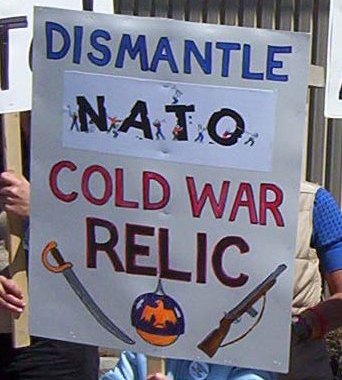 On September 5, the second
and final day of the
NATO Summit in
Newport, Wales,
U.S. President Barack Obama reviewed the decisions the NATO countries
took during the Summit. Obama referred to Article 5 of
the NATO Charter, which specifically deals with "collective
self-defence." He stated, "First
and foremost, we have reaffirmed the central mission of the Alliance.
Article 5 enshrines our solemn duty to each other -- 'an armed attack
against one ... shall be considered an attack against them all.' This
is a binding, treaty obligation. It is non-negotiable. And here in
Wales, we've left absolutely no doubt -- we
will defend every Ally." On September 5, the second
and final day of the
NATO Summit in
Newport, Wales,
U.S. President Barack Obama reviewed the decisions the NATO countries
took during the Summit. Obama referred to Article 5 of
the NATO Charter, which specifically deals with "collective
self-defence." He stated, "First
and foremost, we have reaffirmed the central mission of the Alliance.
Article 5 enshrines our solemn duty to each other -- 'an armed attack
against one ... shall be considered an attack against them all.' This
is a binding, treaty obligation. It is non-negotiable. And here in
Wales, we've left absolutely no doubt -- we
will defend every Ally."
In fact, an essential feature of the NATO Summit was the
proposal
for a
4,000-member standing NATO army as a way to institutionalize Article 5
of the NATO Charter. U.S. President Barrack
Obama and others made repeated references to Article 5 of the NATO
Charter during the Summit. Despite this, the more than 96 hours of live
coverage on
the Summit barely mentioned Article 5. It was not highlighted by any
media
coverage. However, Article 5 is important. It promises any member
suffering aggression or
attack from any other country that the rest of the NATO pact will come
to its aid to repel or end the aggression. In reality it is far more
likely that such institutionalization would
short-circuit much or any need for detailed discussion or further
examination of the real casus belli on the ground.
This aspect of Article 5 is a direct outgrowth of
Chapter 7 of the
UN Charter, which permits the Security Council to deploy armed force as
a collective response to aggression against any member of the General
Assembly. Article 5 was supposed to set in stone the idea that NATO
could not have an agenda or
procedure authorizing the use of force that could be seen in any way to
be or operate in contradiction with the United Nations. Politically it
might only act at the instigation of a superpower overlord wearing
NATO's mantle to conceal a self-interested agenda of that overlord, but
cosmetically it would still have to
measure up to the UN Security Council's Section 7 standard to pass
muster beyond the ranks of NATO.
What has actually taken place is that a NATO force under
a permanent
NATO command is to substitute for the detailed Article 5 procedure of
the NATO Charter. Article 5 procedures are based on the equally
detailed procedures governing UN-authorized military intervention set
out in Chapter 7 of the UN Charter.
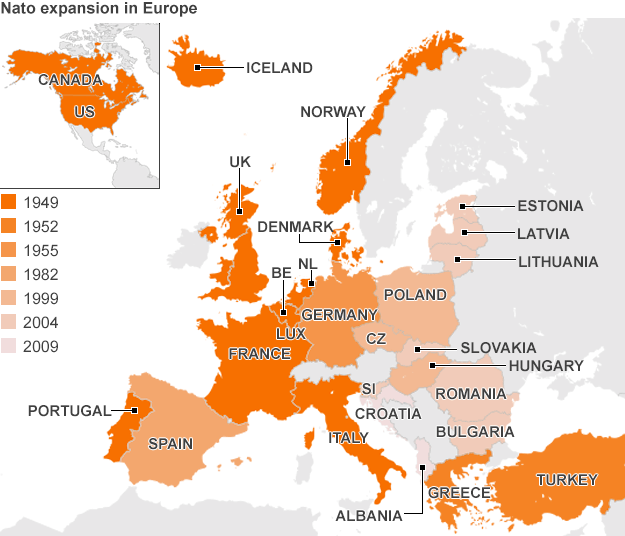
During the 1970s and 1980s, NATO's top directorate did
coordinate
something known as "Standing Naval Forces Atlantic" or STANAVFORLANT.
Of course it was "standing" only in the sense of standing by to be
mobilized for the real thing at some distant future point. In practice,
a flotilla of half-a-dozen
to a dozen vessels from NATO-member navies prowled the Atlantic and
Mediterranean basins each summer to "show the flag" -- while staging no
actual military exercises in the full meaning of that phrase.
Reviewed in that light, it becomes evident that the
proposed
permanent NATO intervention force is exactly the opposite of the
original idea of Article 5. Indeed, it seems intended precisely and
finally to overcome the obstacle that the detailed UN Security
Council's Chapter 7 procedures created for the U.S.-instigated
so-called Coalition of the Willing that eventually invaded Iraq in
March 2003.
The collective security doctrine embodied in Chapter 7
of the United
Nations Charter itself emerged in response to the Axis aggression that
drove the Second World War from its earliest beginnings with the
imperial Japanese invasion and seizure of Manchuria in 1931.
According to that collective security doctrine,
deployment of armed
force against aggression is permitted to a collective of nations
deliberating and resolving a course of action according to the detailed
procedures and deliberations set out under Chapter 7 of the UN Charter.
This starts with a request from a UN
member state or group of member states for military assistance against
aggression from another UN member or members.
Article 5 of the NATO Charter was similarly formulated
to licence
the deployment of counter-force by the member-states of that body in
response to aggression from a non-NATO member (assumed to be the
then-Soviet Union or one of its allies). This was as the final resort
after deliberative procedures very
similar to the UN Chapter 7 model were exhausted.
It is clear that today, as far as the U.S. imperialists
and their
key allies, the UK, Canada and France, are concerned, this latest
proposed permanent intervention force will eliminate any repetition of
the last time Article 5 was invoked. That was back in August 2008, when
it was invoked by the Harvard-trained
Georgian president Mikhail Shakhtiashvili, installed at Tbilsi, to
repel a Russian invasion.
At that time, the French government complained that
Georgia had no
business invoking Article 5's principle of collective self-defence
since Tbilisi was still only a candidate member of NATO, not a full
member. NATO fell silent, Georgia's appeal was buried, the Russian
armed forces entered Georgian territory
shortly after the opening of the Summer Olympic Games in Beijing to
take out organized anti-Russian forces, and Moscow declared a truce
within one week while the Olympic Games continued undisturbed to their
conclusion. Ukraine was already a candidate member of NATO, and they
can draw the obvious lesson
of those events for their present contentious relations with the Putin
administration in Moscow.
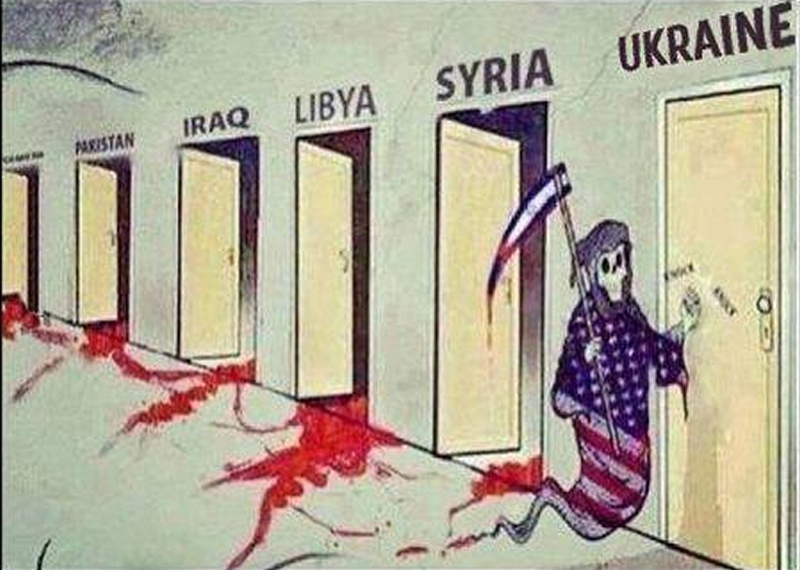 Throughout this past summer, meanwhile,
relations
between official
Ukraine and Moscow have deteriorated into low-level civil war between
the official national army, headquartered in the capital Kiev, and
guerrilla forces, sustained from among the mainly Russian-speaking
regions of Novorossiya in southern
and eastern Ukraine. The population of these regions has been in open
revolt against the western-imposed government at Kiev for most of the
past year. Throughout this past summer, meanwhile,
relations
between official
Ukraine and Moscow have deteriorated into low-level civil war between
the official national army, headquartered in the capital Kiev, and
guerrilla forces, sustained from among the mainly Russian-speaking
regions of Novorossiya in southern
and eastern Ukraine. The population of these regions has been in open
revolt against the western-imposed government at Kiev for most of the
past year.
At
the same time, the intent of the U.S.-led western bloc has been to
ensnare the Ukrainian economy in the clutches of the International
Monetary Fund while preparing the permanent internal occupation of
Ukraine as a whole disguised as "joining NATO." This much can be
discerned from what Russian diplomacy
has been able to expose.
Such are the filthy games that Canadian Prime Minister
Stephen
Harper was cheerleading at the NATO Summit in Wales. Following
the NATO Summit, Canada announced it is sending 13 soldiers to Ukraine
as part of an annual U.S.-led "peacekeeping" exercise. The exercise,
called Rapid Trident 14, will be held at the International Peacekeeping
and Security Center
in Yavoriv, Ukraine, from September 11 to 28, the Prime Minister's
Office said. It is all part of the stepped up war preparations put in
place at the NATO Summit. Nothing
could better demonstrate the urgent necessity to install an anti-war
government in Ottawa and take Canada out of the enslaving
U.S.-imperialist NATO and NORAD "alliances."
Canada Needs an
Anti-War Government!
Canada Out of NATO and NORAD!

Decisions of the NATO Summit
On September 5, the second and final day of the NATO
Summit in Wales,
U.S. President Obama recounted the decisions of the summit at the
closing
press conference.
He began by pledging to implement Article 5 of the NATO
Charter on
"collective security" as the first priority and that NATO would defend
every
ally should they come under armed attack.
Obama continued, "Second, we agreed to be resolute in
reassuring our
Allies in Eastern Europe. Increased NATO air patrols over the Baltics
will
continue. Rotations of additional forces throughout Eastern Europe for
training
and exercises will continue. Naval patrols in the Black Sea will
continue. And
all 28 NATO nations agreed to contribute to all of these measures --
for as
long as necessary."
Next Obama reiterated his doctrine of using drone
warfare and rapid
deployment of Special Forces and "advisors," instead of large
occupation
forces. Obama said, "Third, to ensure that NATO remains prepared for
any
contingency, we agreed to a new Readiness Action Plan. The Alliance
will
update its defence planning. We will create a new highly ready Rapid
Response Force that can be deployed on very short notice. We'll
increase
NATO's presence in Central and Eastern Europe with additional
equipment,
training, exercises and troop rotations. And the $1 billion initiative
that I
announced in Warsaw [on June 3] will be a strong and ongoing U.S.
contribution to this plan." NATO is also to model itself on Pentagon
plans for
rapid deployments of smaller forces, backed up by airstrikes, drones
and
Special Forces, as is occurring now against Iraq.
Obama also spoke to the U.S. demand for Europe to pay
more for war. He
said, "All 28 NATO nations have pledged to increase their investments
in
defence and to move toward investing 2 percent of their GDP in our
collective
security. These resources will help NATO invest in critical
capabilities,
including intelligence, surveillance, reconnaissance and missile
defence. And
this commitment makes clear that NATO will not be complacent. Our
Alliance
will reverse the decline in defence spending and rise to meet the
challenges
that we face in the 21st century."
He also indicated that more countries are to be
embroiled in the U.S. drive
for world empire. "We agreed to expand the partnership that makes NATO
the
hub of global security. We're launching a new effort with our closest
partners
-- including many that have served with us in Afghanistan -- to make
sure our
forces continue to operate together. And we'll create a new initiative
to help
countries build their defence capabilities -- starting with Georgia,
Moldova,
Jordan and Libya."
Obama was joined by Britain and Canada in repeatedly
justifying further
interference in Ukraine and making threats against Russia. And, as was
a main
aim of the U.S., to embroil all the NATO allies in such interference.
As
Obama put it, "All 28 NATO Allies will now provide security assistance
to
Ukraine. This includes non-lethal support to the Ukrainian military --
like body
armour, fuel and medical care for wounded Ukrainian troops -- as well
as
assistance to help modernize Ukrainian forces, including logistics and
command and control."

Actions in Newport Against Aggressive Alliance
Thousands of people in Wales and throughout Britain and
Ireland took part in actions to oppose the warmongering North Atlantic
Treaty
Organization (NATO) summit at the Celtic Manor Resort in Newport,
Wales.
Mass Demonstration, August 30
On August 30, several
thousand people from the local area and from many regions of Britain
gathered
in Newport. More than 1,000 people took part in a militant
demonstration
headed
by the banner "No New Wars -- No to NATO," starting from the civic
centre,
around the streets of Newport, and finishing with a rally that occupied
the
famous Westgate Hotel Square. At the rally, speakers decried the war
crimes
of NATO and the U.S., their wrecking of the rule of international law
and
countries, such as in Iraq, Afghanistan, Palestine and the Ukraine, all
carried
out in the name of the highest ideals.
Mass Demonstration, September 4
On Thursday, September
4, protestors marched on Celtic Manor, site of the NATO Summit's
proceedings, and later held a protest outside Cardiff Castle where a
"banquet
of death" of the world's ruling elite was held that evening.
Counter Summits
As part of the anti-war activities in
Newport counter summits were held on Sunday, August 31 at Cardiff
County
Hall and on Monday, September 1 at the Newport Dolman Theatre. They
condemned NATO as the greatest threat to world peace and had the aim of
building the anti-war movement against NATO, war and militarization and
to
plan future joint actions across Europe. The conferences highlighted
that it is
the U.S. and its big power allies along with their criminal military
alliance
NATO that are behind the mayhem and destruction and war in every part
of
the globe and cause of the most dangerous world situation to date.

Summit Heightens Tensions
Pouring More Fuel on Fire
- Andrei Akulov -
The NATO September 4-5 summit in Wales attended by heads
of
government, another 180 VIPs, and 4,000 delegates and officials leaders
and
senior ministers from around 60 other countries is over as the Alliance
draws
down from its longest ever mission in Afghanistan and against a
backdrop of
instability in Ukraine. Initially convened as a largely ceremonial
event to mark
the end of international involvement in Afghanistan, the forum
addressed a
host of security issues with key topics including the relations with
Russia and
the situation in Ukraine, the escalating Islamic State crisis across
Iraq and
Syria, the threat posed by foreign fighters returning from the Middle
East
conflicts.
A string of military exercises created the background
the summit took
place against.
U.S. Exercise Saber Junction in transition phase to a
large-scale,
multinational NATO military exercise called Steadfast Javelin II,
kicked off
on Tuesday September 2 to last till September 8. This portion of the
exercise
involves hundreds of vehicles, aircraft and soldiers from 9 different
nations.
The training event takes place across 5 NATO countries: Germany,
Estonia,
Latvia, Lithuania and Poland. The Steadfast Javelin II phase will be
led by
NATO's Allied Land Command (LANDCOM) and will facilitate the training
of more than more than 2,000 multinational soldiers in unified land
operations
and interoperability. Multinational participants in the over-arching
Saber
Junction include the following NATO allies: Bulgaria, Canada, Czech
Republic, Estonia, Italy, Latvia, Lithuania, Poland, Romania, Slovenia,
United
Kingdom, and the United States; and the NATO Partnership for Peace
(PfP)
nations: Bosnia-Herzegovina and Serbia.
With about 600 Czech and 300 foreign soldiers NATO
launched Ample
Strike 2014 military exercise on September 3. The participants are
using about
30 helicopters and aircraft at the bases in central and south Bohemia.
The drill
includes soldiers from 10 other NATO members: Belgium, Denmark,
Estonia,
Germany, Hungary, Lithuania, the Netherlands, Slovakia, the United
Kingdom
and the United States. It will last till September 15.
One more training event is to take place in Latvia by
the end of this
month, bringing the host country's military together with a thousand
strong
force made up by U.S., UK and Estonia military.
Rapid Trident, a multinational force training event
(formally not a NATO
only drill) is planned for mid-September as an anti-Russia muscle
flexing
demonstration to take place near the Polish border with participation
of 1,000
military (200 from the U.S.) from Ukraine, Azerbaijan, Georgia,
Moldavia,
Latvia, Lithuania, the UK, Canada, Germany, Poland, Romania and Spain.
At least four NATO ships patrol Black Sea waters.
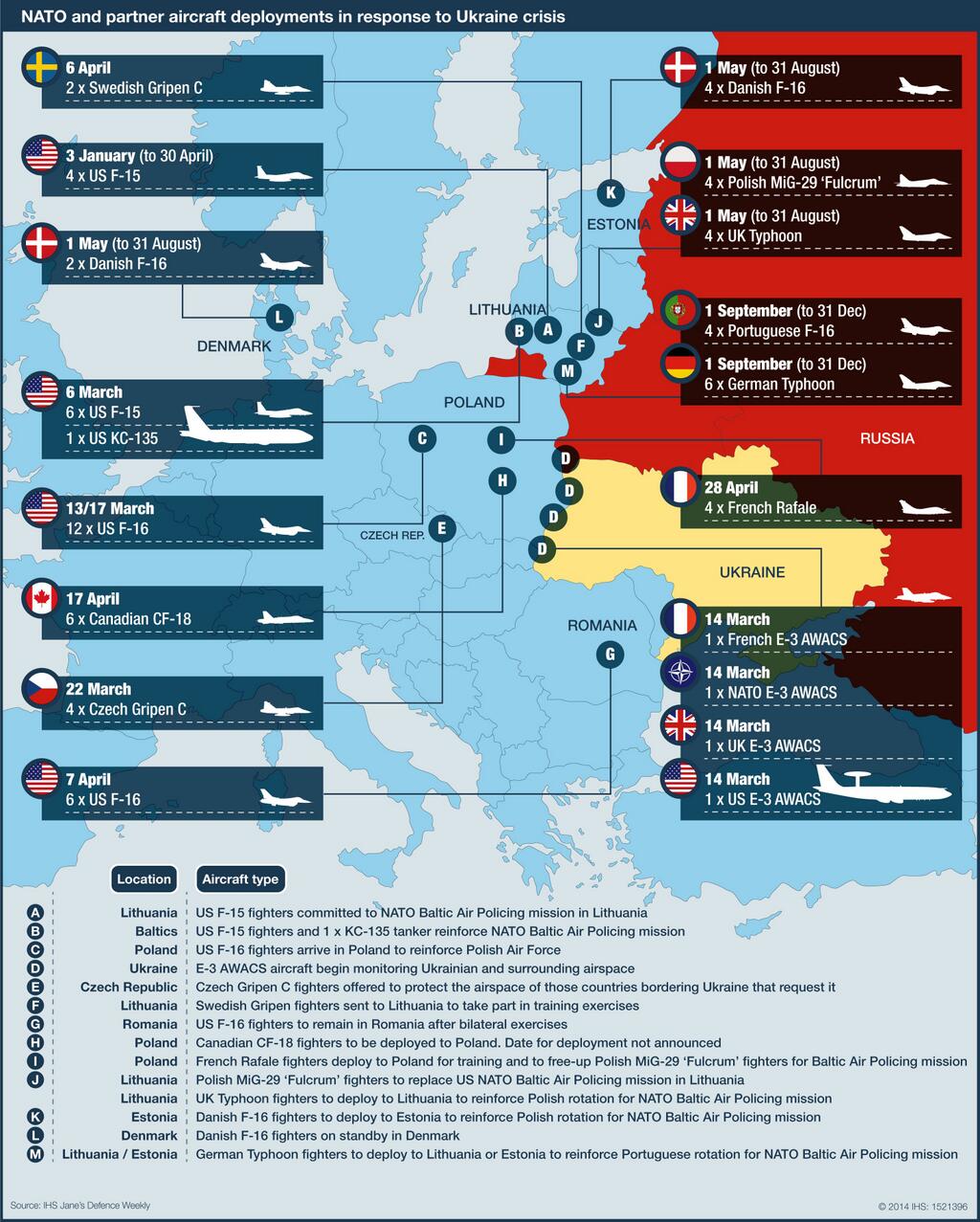
NATO aircraft
deployments in response to "Ukraine crisis" in April 2014 -- click to
enlarge.
|
Visiting Estonia before flying to Wales President Obama
announced plans
to send Air Force units and aircraft to the Baltic republics as part of
an effort
to reassure the countries of Estonia, Latvia, and Lithuania of their
security as
NATO members in the wake of the ongoing unrest in Ukraine. Standing
shoulder to shoulder with Estonia's president, Obama called Estonia's
Amari
Air Base an ideal location to base those additional forces, which come
as
NATO nations prepare to bolster a rapid-response force for the region.
The rising tensions accompanied the summit taking
decisions to pour even
more fuel on fire.
Russia is not watching the events idly. Its strategic
nuclear forces will
conduct major exercises this month involving more than 4,000 soldiers,
the
Defense Ministry said on September 3. The drill will take place take
place in
Altai in south-central Russia to include around 400 technical units and
extensive use of air power. The troops will practice countering
irregular units
and high-precision weapons, and "conducting combat missions in
conditions
of active radio-electronic jamming and intensive enemy actions in areas
of
troop deployment."
[...]
With truce achieved in Minsk on Sept. 5, the leaders of
states with
NATO-EU membership approved the idea of imposing further sanctions
against Russia if hostilities continue in Ukraine; no matter Russia is
not a party
to the conflict. Secretary General Anders Rasmussen said weapons
supplies to
Ukraine are a decision to be taken individually by the members. NATO is
expected to set up new trust funds to help Ukraine better defend
itself. The
assistance is expected to come in the form of logistics, from fuel to
spare
parts; defense against cyberwarfare; improving intelligence, command
and
control; and importantly, help for veterans' payments. At that the
Alliance has
made it clear that it does not intend to become involved militarily in
Ukraine
and scheduled a symbolic meeting at the summit with Ukrainian President
Petro Poroshenko.
Besides looking for new ways to punish Russia, the
organization also
tackled the problem of forces repositioning and pledging more money for
military spending and recommitting to collective defense. In 2006 all
member
countries pledged to spend 2% of their GDP on defence. In Europe only
Britain, France, Greece and Estonia met that benchmark last year
(although
Poland is getting there).
There was no definite decision of Afghanistan as the
impasse over the
runoff vote has prevented the inauguration of a new head of state.
Outgoing
President Karzai has refused to sign a bilateral security agreement
that would
set the terms for nearly 10,000 American troops to remain in
Afghanistan into
next year, mostly as advisers and trainers. A similar agreement with
NATO
has been held up because of its dependence on the American presence. If
there
isn't a legal basis for NATO's continued presence in Afghanistan, it
will have
to withdraw everything by the end of the year.
This time the agenda included one of the most
contentious and thorny
issues of whether to place troops permanently in Eastern Europe. The
summit
backed a "Readiness Action Plan" aimed at strengthening the offensive
capability. The plan aims to reduce the time for NATO forces to launch
attack
on short notice. It will come with increased air policing and other
visible signs
of alliance protection.
To top the list are the plans to set up a "spearhead" to
the NATO rapid
force, led under a six-month country rotation and consisting of several
thousand troops, with air, sea and special forces support. The UK is
willing to
contribute 3,500 troops to the unit. The plan would establish reception
facilities, prepositioned equipment and supplies, command and control,
and
logistics facilities. The new high-readiness brigade will be deployable
in
Eastern Europe within two days. The unit would have a permanent command
centre staffed by rotating alliance members as well as supply depots
located
in various regions so troops would not have to fly in all their
equipment.
Heavy weapons will be pre-positioned in Poland to be used later by
"follow-on" forces and a new command-centre will be established on
Polish
soil too. There will be an upgraded schedule of military exercises and
deployments that are intended to make NATO's strike potential more
credible.
There is insufficient detail on who exactly might pay the bills or
contribute
troops except the UK and what the rules of engagement would be.
A Polish request for 10,000 troops, including a sizeable
American
contingent, to be permanently based in that country was rejected,
because it
was provocatively too close to Russia's borders and would contravene
the 1997 NATO-Russia Founding Act.
Member
countries
such
as Germany rejected the
idea.
NATO insists it still abstains from putting permanent
bases in Eastern and
Central Europe. Indeed, at first glance the new plan does not seem to
technically breach that agreement, but the difference is rather
semantic offering "persistent," presence instead of "permanent."
There is another force to bolster NATO's power. The UK
and six other
states agreed to create a new very high readiness joint expeditionary
force
(JEF) of at least 10,000 personnel to act as spearhead for the NATO
response
force (NRF). The aim is to create a fully functioning, division-sized
force for
rapid deployment and regular, frequent exercises. Officials involved in
the
planning say it will have the capacity to increase significantly in
size. The
force will incorporate air and naval units as well as ground troops and
will be
led by British commanders with other participating nations contributing
a range
of specialist troops and units. Countries involved at present include
Denmark,
Latvia, Estonia, Lithuania, Norway and the Netherlands. Canada has also
expressed an interest in taking part. The model for the new JEF will be
Britain's expeditionary force with France, which has been years in the
making
and is due to be fully operational by 2016. Coordinating a force across
seven
nations is likely to be an even bigger endeavor. Britain will undertake
much
of the initial legwork in organizing the structure and logistics. The
British plan
runs in parallel to a German framework nation initiative, in which
Berlin will
work with some 10 East European partner nations to boost their
capabilities.
Australia, Sweden, Finland, Jordan and Georgia were
officially named
enhanced partners of the organization recognizing their contribution to
NATO
operations over the past decade. Sweden and Finland also signed a pact
that
allows assistance from alliance troops in the Nordic countries in
emergency
situations -- a "Host Nation Support memorandum of understanding" which
would see NATO help the country to prepare for training exercises and
ease
military support in the event of a crisis or conflict. Australia
already has a
partnership agreement with NATO signed by the previous government,
which
covers the sharing of technology and intelligence, and joint training
and
personnel swaps. However the new enhanced partnership agreement --
which
Australia signed along with Finland, Georgia, Jordan and Sweden -- is
expected
to mean a seat at the table for more of NATO's key deliberations and
give
these countries permanent access to the organization's planning at the
earliest
stages of future operations and ensure their presence in its governing
councils.
No bones about it -- taking part in planning and deliberations actually
makefs
enhanced partners of NATO, especially Sweden and Finland, members of
the
alliance. Informally they have joined. The both countries want NATO
troops
on their soil making themselves targets in case of conflict. Opinion
polls in
Finland and Sweden show majority opposition to NATO membership. Both
countries were officially neutral during the Cold War. Nobody asked
common
people if they want to be NATO members and become targets in case of
war.
No referendums, no votes as their respective governments avoid the term
membership by calling it enhanced partnership instead. What a
difference a
word makes!
Meanwhile, NATO is facing a growing challenge on its
southern flank --
the summit generated a collective call to meet the challenge, but
nothing in
concrete terms. President Obama failed to corral leaders to work toward
a
strategy to defeat the rapidly rising Islamic State (IS) militants in
Iraq and
Syria. The Americans have announced they are forming a "core coalition"
to
fight the Islamic State. Ten countries involved are: the U.S., Britain,
France,
Germany, Italy, Denmark, Turkey, Poland, Canada and Australia.
No strategy for defeating the extremists is agreed on.
With fighters from
the IS holding large swaths of territory across Syria and Iraq, allies
fear
fighters with European and American passports could carry out attacks
at
home. Turkey, a longtime NATO member, has served as a prime transit
route
for many of those fighters. With an estimated 15,000 fighters,
including up to
7,000 members who carry European passports, the Islamic State has been
described by some as more dangerous than al-Qaida. Several hundred
fighters
also are believed to be American.
***
One can find free cheese only in a mousetrap. It goes
for rotational, and even more permanent, presence in Eastern Europe.
The
Europe's share in the global GDP is 26% in comparison with 23% for the
USA. At that America accounts for 70% of NATO's defense expenditure
(used
to be 50% in the days of Cold War). On average Europeans spend 1.6% of
GDP on military needs against 4.5% allocated for defense related
purposes by
the United States. There is a wide gap here. The summit failed to solve
the
problem. These are rough times for Europe and it's hard to imagine
taxpayers
being happy to pay for greater military effort. Another Cold War is not
what
common people of NATO European members need now. The alliance is not
that unanimous as it may seem at first glance. The "one for all and all
for
one" principle doesn't work here. For instance, the Hungarian Prime
Minister
says the days of liberal democracy are over. He wants Kiev to grant
autonomy
to Hungarians living in Transcarpathia. The issue of permanent NATO
bases
in East Europe is divisive. The French, Italians and Spanish are
opposed while
the Americans and British are supportive of the eastern European
demands.
The Germans are sitting on the fence wary of provoking inevitable
Russian
response. Robert Fico, the Prime Minister of Slovakia, supported Russia
in the war with Georgia in 2008 and refused to condemn the Crimea
referendum.
He doesn't approve the deployment of missile defense in Poland and the
Czech
Republic. Asked about his attitude towards hypothetical NATO forces
deployment of Slovakian soil, he compared it with the Soviet Union
bringing
in troops in 1968.
The U.S. is burdened with the heavy load of public debt.
Europe is actually
in recession with immense economic difficulties to face. The Alliance
is not
unanimous on key issues. The Islamic State is at the door. This is a
real, not
an imaginary threat. These are not the best times for confronting
Russia which
has not done anything to threaten the organization and has been
adhering to
the Founding Act provisions. Overstretching will hardly help NATO
become
more efficient addressing real security challenges, but it will
certainly reduce
living standards of grassroots and make them less secure.

Western Doublethink on Blind Path to War
- Finian Cunningham -
In October 1962, the United States threatened to go to
war with Russia over the Cuban missile crisis. That high-stakes drama
came about after Washington learned that Soviet leader Nikita
Khrushchev had overseen the installation of ballistic missiles on the
Caribbean island, some 90 miles from the U.S. mainland.
Never mind that the nascent military alliance between Moscow and the
socialist government of Fidel Castro was a inviolable matter between
two sovereign states -- Washington was apoplectic that Soviet missiles
were permitted anywhere near its territory. The then U.S. President
John F. Kennedy was impelled to go
to war over the issue, even if that meant igniting an all-out
thermonuclear conflagration.
In the end, the standoff was resolved, in part through a
mutual personal understanding between Kennedy and Khrushchev that such
a catastrophic war had to be avoided at all costs. The Soviet Union
eventually withdrew its missiles after receiving a guarantee from the
White House that there would no follow-up U.S. invasion of Cuba, as in
the failed CIA-backed Bay of Pigs assault of
April 1961. In addition, Kennedy gave a commitment to reciprocate U.S.
missile withdrawal from Turkey's territory bordering with the former
Soviet Union.
Now fast-forward 52 years. The U.S.-led NATO alliance
[in early September] announced that it intends consolidating its
military presence in
Eastern Europe, the Black Sea and the Baltic states. Ahead of a NATO
summit in Wales, NATO secretary Anders Fogh Rasmussen has called for
the setting up of "reactive battalions"
along Russia's border. The contingency would include the eventual
placement of ballistic missiles and it builds on recent dispatches of
NATO warships and fighter aircraft in the region.
Moscow, in response, said it is now revising its defense
doctrine to take reciprocal measures to protect its territory. "When
NATO troops are approaching our borders, of course, we
develop a plan. I recall NATO's commitment not to expand the bloc's
territory eastward," said Russian Public Chamber deputy
secretary Sergei Ordzhonikidze.
That referred commitment of no NATO eastwards expansion
was given by American leaders to Russian counterparts throughout the
1990s following the demise of the Soviet Union. Yet what has happened
over the past two decades is the exact opposite -- the relentless
encroachment of NATO military along Russia's
borders. The conflict in Ukraine over the past year has served to
provide Washington with a tenuous rationale for escalating NATO
contingencies in the region on the back of unfounded claims about
Russia's invasion and annexation of Ukrainian territory.
Economic sanctions imposed by Washington and its
European allies -- the latest round announced [in early September] --
are applied
with the same reckless abandon as NATO build-up. No concrete evidence
of alleged Russian malfeasance in Ukraine is produced to validate
sanctions or NATO battle plans. It is all done as
a fait accompli on the basis
of assertion. U.S. President Barack Obama
says Russian military intervention in Ukraine is "plain to
see" while not presenting a shred of credible evidence. Britain's
premier David Cameron and German chancellor Angela Merkel, among
others, sound like echo chambers for White House
words, calling for more punitive sanctions and NATO "readiness."
Moscow
is right to denounce such Western conduct as "hysterical" and divorced
from reality. The U.S. and its
European subordinates have created the conflict in Ukraine by
subverting the elected government in that country to install a wholly
illegitimate regime in Kiev. The fascist nature of this regime has no
mandate to rule and especially over the pro-Russian populations in the
east of the country, which the Nazi-honoring junta in Kiev despises as
"sub-humans." Since the Western-backed regime launched its
so-called "anti-terror operation" in April in the eastern
regions, more than 2,500 people -- mainly civilians -- have
been killed. Some one million people have been displaced from their
homes, according to the United Nations. Much of the violence has
stemmed from Kiev's military forces indiscriminately bombarding
civilian centers around the cities of Donetsk and Luhansk. There have
been credible reports of the use of cluster
bombs, white phosphorus incendiaries and unguided Grad rockets.
The Western sponsors of this indisputable state
terrorism against civilians have abdicated all responsibility for their
policy of criminal interference in Ukraine's internal affairs. Yet they
turn round with crass irony and blame Russia for the conflict and chaos.
Irresponsible Western governments and corporate media
add to their recklessness by amplifying provocative claims coming out
of Kiev and its puppet president Petro Poroshenko, accusing Russia of
embarking on the "greatest war" in Europe since the Second
World War. Again, no evidence is presented, just
the mindless assertion of febrile imaginations.
Part of the "reasoning" behind claims that
Russian military has invaded Ukraine is the collapsing positions of
Kiev's forces in the southeast of the country. The military setbacks
for Kiev is thus "explained" on the assumption that
superior forces "must be" operating with professional
Russian soldiers and heavy
munitions. But there are several other plausible explanations for why
Kiev's anti-terror squads are in disarray, such as mass desertions of
Ukrainian soldiers across the Russian border, disaffected with their
mission to kill civilians, or the complete incompetence of Kiev's
military planners. The latter was implicit in
Poroshenko's announcement [in early September] that "heads would roll"
among commanders at the defence ministry.
The crisis in Ukraine -- which continually threatens to
spin out of control into a self-fulfilling wider war -- is the result
of
Western hubris, hypocrisy and doublethink. Western leaders seem
paralysed by a chronic inability to see their own contradictions, no
matter how brazen and fatuous these contradictions.
The Cuban missile crisis more than half a century ago
provides an instructive analogy with today's standoff between West and
East. In the former case, Washington was prepared to plunge the world
into a nuclear conflagration over perceived Russian military
encroachment on its territory, even though Russia's
incipient presence in Cuba was arguably legal and non-threatening.
Today, by contrast, the American-led NATO alliance is illegally pushing
its offensive firepower all the way into Russia's face -- against all
erstwhile commitments not to do so -- and yet Washington believes it
has
the prerogative to keep pushing
without any complaint from Moscow.
So far, Moscow has dealt with this unprecedented
provocation with admirably restrained diplomacy even though Vladimir
Putin must feel that he is contending with obtuse Western counterparts
who can't seem to comprehend the rules of checkers, never mind the game
of chess.
At least John F. Kennedy had a rudimentary grasp of
reality and a degree of empathy with his Russian opponent Khrushchev,
which eventually helped dissipate that distant crisis. Unfortunately,
the same cannot be said of Barack Obama and other Western leaders
today, all of whom appear to be blinded by chronic
doublethink.

PREVIOUS
ISSUES | HOME
Read The Marxist-Leninist Daily
Website: www.cpcml.ca
Email: editor@cpcml.ca
|




 The Harper
government openly speaks about what governments they want or do not
want
in countries, as if the peoples of those countries are irrelevant and
have no right to decide their own futures or
the governments that they desire. It is to their shame that the
opposition parties are giving this sham a veneer of all-Canadian
support despite the fact that it has none. This is in keeping with
their utter contempt for the polity in Canada as well.
The Harper
government openly speaks about what governments they want or do not
want
in countries, as if the peoples of those countries are irrelevant and
have no right to decide their own futures or
the governments that they desire. It is to their shame that the
opposition parties are giving this sham a veneer of all-Canadian
support despite the fact that it has none. This is in keeping with
their utter contempt for the polity in Canada as well.
 On September 5, the second
and final day of the
NATO Summit in
Newport, Wales,
U.S. President Barack Obama reviewed the decisions the NATO countries
took during the Summit. Obama referred to Article 5 of
the NATO Charter, which specifically deals with "collective
self-defence." He stated, "First
and foremost, we have reaffirmed the central mission of the Alliance.
Article 5 enshrines our solemn duty to each other -- 'an armed attack
against one ... shall be considered an attack against them all.' This
is a binding, treaty obligation. It is non-negotiable. And here in
Wales, we've left absolutely no doubt -- we
will defend every Ally."
On September 5, the second
and final day of the
NATO Summit in
Newport, Wales,
U.S. President Barack Obama reviewed the decisions the NATO countries
took during the Summit. Obama referred to Article 5 of
the NATO Charter, which specifically deals with "collective
self-defence." He stated, "First
and foremost, we have reaffirmed the central mission of the Alliance.
Article 5 enshrines our solemn duty to each other -- 'an armed attack
against one ... shall be considered an attack against them all.' This
is a binding, treaty obligation. It is non-negotiable. And here in
Wales, we've left absolutely no doubt -- we
will defend every Ally."
 Throughout this past summer, meanwhile,
relations
between official
Ukraine and Moscow have deteriorated into low-level civil war between
the official national army, headquartered in the capital Kiev, and
guerrilla forces, sustained from among the mainly Russian-speaking
regions of Novorossiya in southern
and eastern Ukraine. The population of these regions has been in open
revolt against the western-imposed government at Kiev for most of the
past year.
Throughout this past summer, meanwhile,
relations
between official
Ukraine and Moscow have deteriorated into low-level civil war between
the official national army, headquartered in the capital Kiev, and
guerrilla forces, sustained from among the mainly Russian-speaking
regions of Novorossiya in southern
and eastern Ukraine. The population of these regions has been in open
revolt against the western-imposed government at Kiev for most of the
past year.